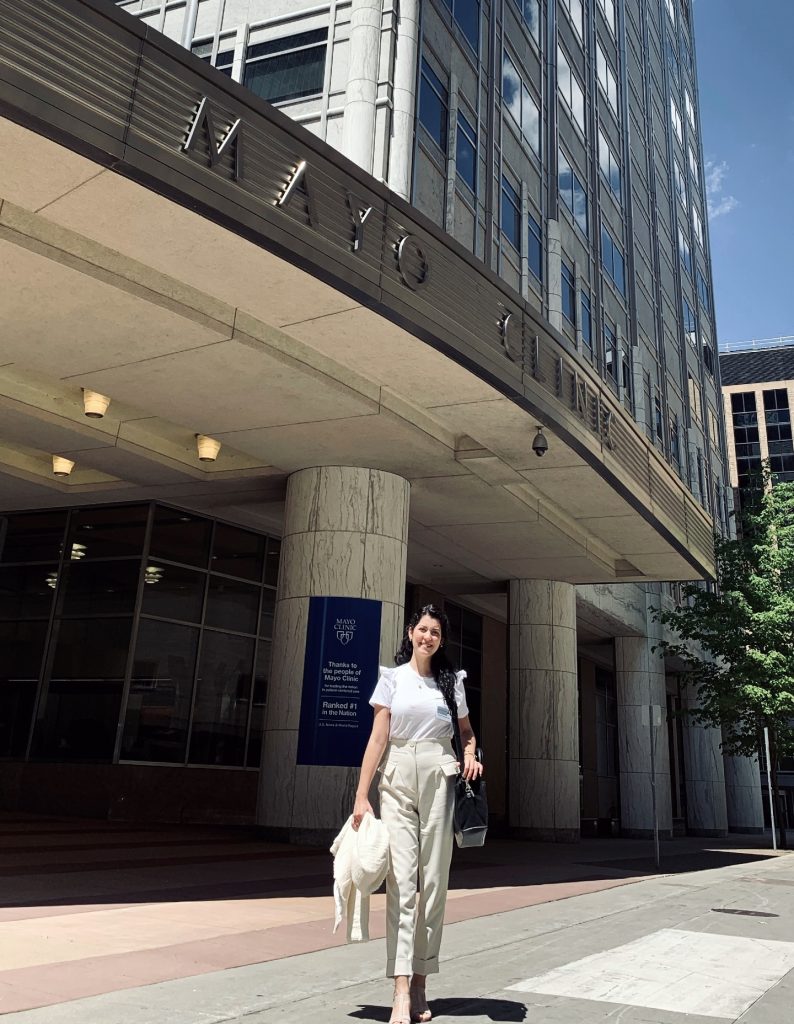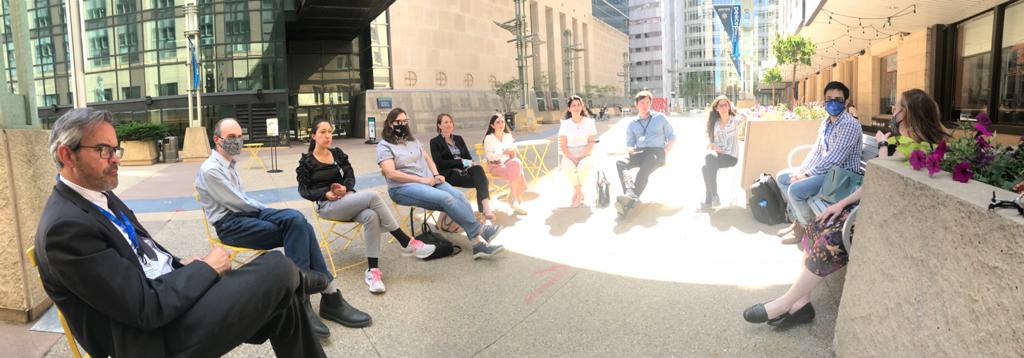29/06/2021
María José Hernández Leal, PhD fellow of the Martí i Franquès COFUND Doctoral Programme
“Mayo Clinic is the most prestigious and internationally recognized clinic, and it is a real privilege to be here”

María José Hernández is doing her research on elicitation of preference and shared decision making in screening programs, as part of the PhD programme at Universitat Rovira i Virgili
How did you learn about the MFP-COFUND grants, and why did you choose the URV?
I completed my master’s degree in nursing in Chile on Shared Decision Making (SDM) in Primary Care. My thesis was supervised by Dr Paulina Bravo and Dr Lilisbeth Perestelo-Pérez as an external evaluator. Lilisbeth has extensively developed this topic in Spain, so after finishing my master’s thesis, she talked me about the URV’s Martí i Franquès COFUND Call. I decided to apply for the fellowship at the URV because the research project they offered was very close to what I was already studying, and also because it would give me the opportunity to learn new methodologies and research topics that until now were foreign to me, as the Health Economy. Definitely, it was a great complement to enrich my research profile and internationalise my career.
How would you explain your research to a non-scientific audience?
My research topic is about the relationships that take place in the medical appointment, putting the Patient in the Center. SDM, i.e. the participation of the patient regarding the selection of therapeutic goals and treatment options, is a participative health model and a style of decision-making involving health care providers (HCPs) and patients. From that point of view, both HCPs and patients are experts: HCPs handle scientific evidence, and patients know about their own experiences, expectations, and values of their diseases. Therefore, they could make decisions together. This model has proven to be beneficial especially in contexts of uncertainty, where taking an alternative does not seem to be so clear.
What are the main applications of your research? Could you give us an example?
My thesis focuses on breast cancer screening, applying SDM in mammography. In many European countries, and in the United States too, women only receive a letter indicating the date, time and location where to go for a mammography. This kind of information prevents women from talking to health professionals about possible outcomes that might be undesirable, such as false positives, false negatives, overdiagnosis, or overtreatment. Therefore, the first step is to be able to assess the risks and benefits of screening. It is also necessary to go a step further and facilitate that women have the opportunity to solve their doubts regarding prevention, promotion, or the results in themselves.
Do you think that your research topic will be a key element in the near future?
Absolutely! The SDM has many direct or indirect implications. Currently, the majority of health programs worldwide are in line with the principle of Patient-Centered Care, which have gained ground in public policies, just like the right to be informed. Nevertheless, if we want the SDM remaining no more than declarations of intent, we must deepen its knowledge. Health professionals have also become aware of the importance of involving patients in decisions, as it is an ethical duty of the profession to maintain patient autonomy as much as possible. However, much remains to be done both at the macro level -the organisational structure of screening programs- and at the micro level -for instance, developing materials and pictographs about risks and benefits, or training in risk communication for health professionals.
What have you liked the most of your experience at the URV?
My experience at the URV has been good, despite spending part of it in the midst of a pandemic and confined. First, my research team is very solid and they have guided me in my learning process. They, and specially Dr Misericòrdia Carles and Dr María José Pérez, have not only been generous in sharing their knowledge, but also from a personal point of view. I believe it is essential for those of us who are so far away from our homes to have that support. I have also established bonds of friendship with my office colleagues. Moreover, Tarragona is a comfortable and warm city. What I like most is its architecture and cultural heritage, and its maritime landscape.

You are now in your international secondment at Mayo Clinic, in the United States. What exactly are you doing there?
Mayo Clinic is the most prestigious and internationally recognized clinic, and it is a real privilege to be here. Specifically, I am in the Knowledge and Evaluation Research Unit (KER Unit). The KER Unit focuses on discovery, translation, and dissemination of health services research for patients and society. They research about the best ways to advance evidence-based, patient-centered care, including interventions that promote shared decision-making, reduce the burden of treatment on patients’ lives, and help recover health and enable human flourishing. I have joined projects with different approaches to SDM, some of them related to weight management, osteoporosis, and appointment timing impacts. Furthermore, I seek to deepen my research on breast cancer screening.
How do you think this international secondment will contribute to your career?
Mayo Clinic is a great experience! My objective is to learn about new methodologies and research topics, and learn about their way of working too. I have found in my time in Mayo Clinic the benefits of working in a multidisciplinary team. Health professionals do not only compose their teams, whatever people may think about being in a clinic, but also they incorporate various professional profiles. Another advantage of being here is the quick access to patients and professionals, which is a huge advantage in comparison with working within the academia. Finally, being here has helped me to create new networks and collaborations with professionals working in SDM.
What is being the best thing about your time staying in a foreign university? Is there something that has surprised you about their way of working?
I think the best aspect of this secondment is the quick access to patients, and the new research methodologies I have learned, for example, the analysis of recorded medical appointments. In addition, work in a team with the same research interests than you but with different approaches to the topic is incredibly worthwhile for me. It is a new drive to improve! Finally, living abroad implies personal development and growth: new lifestyle, culture, experiences, interests, friends…
What have you planned once you finish your PhD?
I would like to develop an international career and continue studying and learning. I believe it is the duty of all researchers to continue training throughout their lives. I would like to apply for a postdoctoral position and continue developing SDM, as it has a great potential, and join efforts with other researchers interested in this topic. From a personal point of view, I would like to continue linked to other projects such as Hayek Labs, founded by two friends and me, an independent public policy institute in Chile. I would like to continue contributing to the improvement of Chileans’ quality of life, wherever I live.
